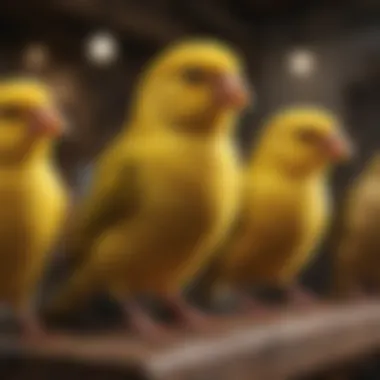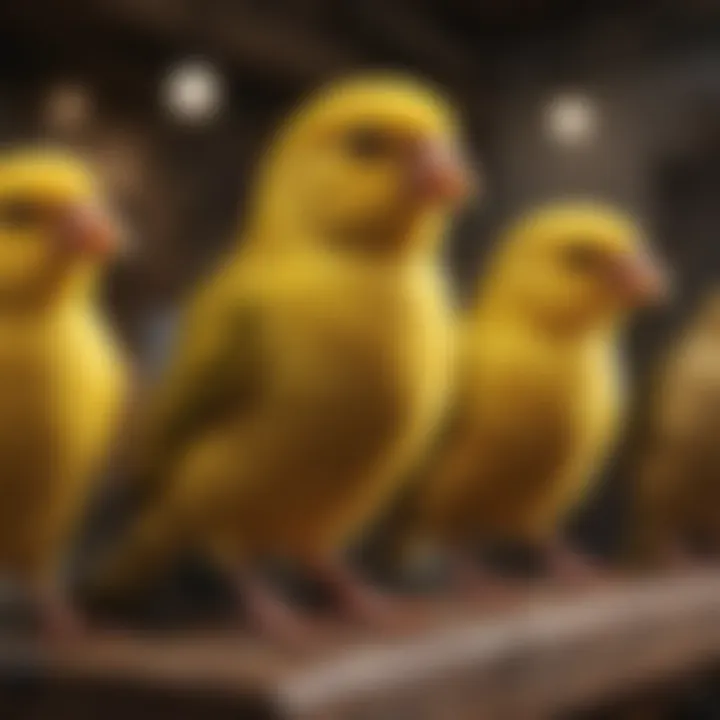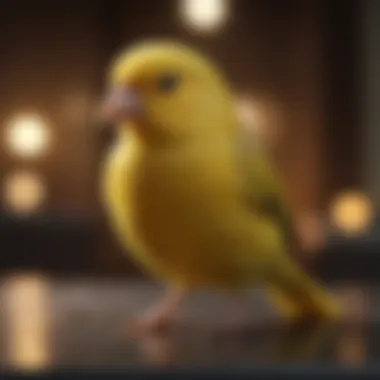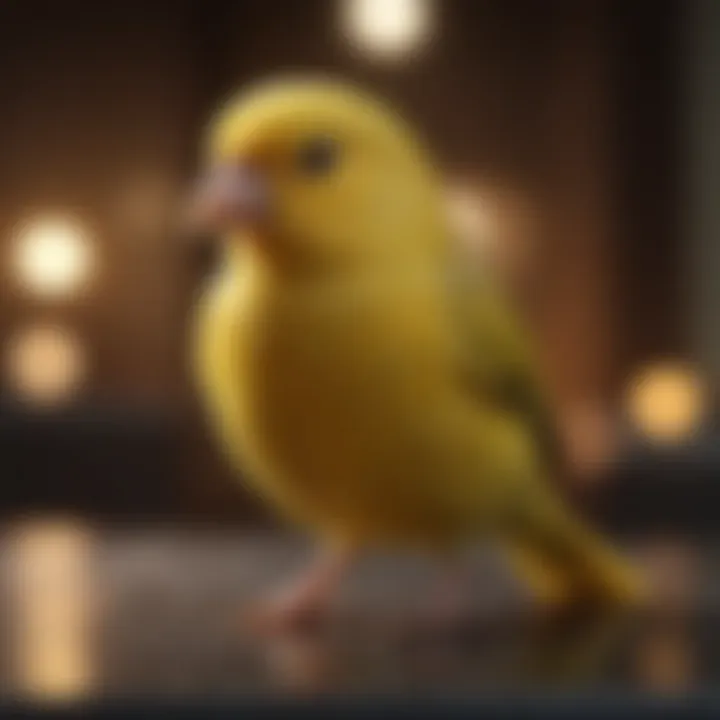Exploring the Economics of Canary Bird Ownership


Intro
Canary bird ownership offers a unique blend of companionship and responsibility, drawing in many pet enthusiasts and casual bird lovers alike. This fascinating journey isn't just about the fluttering beauty of these vibrant creatures; it's also intricately tied to economic considerations that can make or break the experience for potential owners. Understanding the financial landscape of canary ownership requires a deeper dive into not just the purchase price, but also the costs of care, the nuances of breed selection, and the market trends that shape these factors.
Exploring the economics behind canary bird ownership goes beyond just numbers. It's about making informed decisions that best suit both your lifestyle and your wallet. With varying breed characteristics and an array of hidden costs lurking beneath the surface, prospective owners must be equipped with key insights to navigate this colorful world successfully. This article aims to shine a light on the relevant economic considerations, allowing potential pet parents and bird enthusiasts to weigh their options carefully and enjoy the journey with their charming companions.
Intro to Canary Bird Ownership
Delving into the world of canary bird ownership brings several aspects to light, each one reinforcing the importance of understanding what it means to welcome these delightful creatures into your home. Beyond the charm they exude and the sweet melodies they produce, the financial and emotional investments associated with canary ownership are significant. This article aims to demystify these complexities, guiding potential bird owners through every facet of canary care and financial commitment.
The Appeal of Canaries as Pets
Canaries, with their vibrant hues and enchanting songs, bring a touch of vibrancy into any dwelling. Their beauty is undeniable, often showcasing colors that can range from bright yellows to deep greens and even fiery reds. This visual appeal is coupled with their engaging vocalizations, which can lift anyone's spirits. Moreover, canaries tend to embody a lively spirit, often seen flitting about their cages.
Their manageable size makes them an ideal pet for various living situations. Whether one resides in a cozy apartment or a spacious house, canaries fit comfortably into most environments. Unlike larger pets that require significant space and daily exercise, canaries are content to inhabit their cage, provided they receive regular attention and mental stimulation. For many, this creates a perfect balance between companionship and low maintenance.
Additionally, the presence of a canary can foster a sense of calm. Their songs can soothe an anxious mind or fill a quiet room with pleasant sounds. It's no wonder these birds have been cherished companions across cultures for generations. A canary doesn’t just sing; it offers its owner a chance to pause and enjoy the simpler things in life.
Understanding the Commitment
While the allure of owning a canary may be strong, it's essential to grasp the full scope of commitment involved in their care. Owning any pet is not a fleeting endeavor; it requires a willingness to invest time, money, and emotional resources.
First and foremost, potential owners must consider the lifespan of canaries. Typically, with proper care, canaries can live anywhere between 10 to 15 years. This longevity means that once you take a canary into your home, you are making a long-term commitment that involves ongoing care and attention.
Furthermore, the financial aspect can’t be overlooked. Initial costs may include purchasing the bird itself, but this is just the tip of the iceberg. Ongoing expenses for food, bedding, and veterinary care add up. As the old saying goes, "A penny saved is a penny earned," but with canaries, it's crucial to budget appropriately to ensure their health and happiness.
It's also vital to note the emotional commitment. Each canary has its distinct personality, and understanding these nuances may take time. Owners should approach canary ownership not just as caretakers but as guardians who develop an emotional bond with their feathered friends.
In summary, while the thought of owning a canary can be enticing, comprehending the responsibilities that come with it is critical. This knowledge not only enhances the experience for the owner but ultimately leads to a happier, healthier life for the bird.
Market Overview of Canary Prices
Understanding the market landscape for canary bird prices is crucial for potential owners and enthusiasts alike. Knowing where the financial tendencies lie can give not only a clearer view of what one might spend but helps set realistic expectations. This overview focuses on the average costs involved and the nuances that drive those prices, shaping the decision-making process.
Average Price Range of Canaries
When delving into the costs of canaries, you're likely to encounter a broad price spectrum. Generally speaking, canaries may range from a modest $20 to upwards of $200 or more, depending heavily on their specific traits.
For example, the common breeds like the British or American Singers often rest at the lower end of that scale. They offer a delightful experience without breaking the bank. On the other hand, rarer breeds or those with unique colors may likely fetch a much higher price.
In addition to breed, where you source your canary also plays a significant role. Purchasing from a reputable breeder can often ensure not only a fair price but also the assurance of the bird’s health and lineage.
Factors Influencing Pricing
The pricing of canaries hinges on various elements. Understanding these can significantly aid buyers in evaluating their choices.
Breed
The breed of the canary is perhaps one of the most impactful factors in determining its cost. Certain breeds, such as the Gloster, are particularly cherished for their charming appearance and vibrant songs. These birds are often seen as a status symbol among pet bird owners, leading to increased demand and, consequently, higher prices. Furthermore, Berkshire canaries, known for their striking looks and personality, can also carry a heftier price tag.
The unique characteristics these breeds bring to the table can set them apart, making them more desirable. For instance, some breeds may have particular color variations or singing capabilities that cause them to stand out. Altogether, this creates a market where breed variety shapes financial expectations significantly.
Color
Canary color is another defining trait affecting price. A bird with rare colors like the Black Face, known for its stunning appearance, can command a premium price in the marketplace. The common yellow canary, while popular, tends to sit at the more affordable end due to its abundance in breeding stock.
The vibrant palette available among canaries allows buyers to choose exactly what strikes their fancy, but this can also complicate the buying decision. Some colors may be more readily available, while others can become unique finds, driving prices upwards. Each shade and hue comes with a story, making them magnificent as visual companions.
Age
Finally, the age of the canary presents another layer to the pricing strategy. Younger canaries often sell for less, as they require more effort for training and socializing. However, more mature birds that have been properly socialized tend to command higher prices due to their established temperaments and singing ability.


Certain owners may prefer a younger bird to raise it according to their preferences, creating an environment that best fits their lifestyle. Conversely, mature canaries offer immediate companionship with fewer unknowns, albeit at a higher initial investment.
The interplay of breed, color, and age creates a unique financial landscape for canary ownership, shaping not just initial costs but the overall experience of having these charming birds as companions.
Types of Canaries and Their Costs
Understanding the different types of canaries and their associated costs is essential for anyone considering becoming a canary owner. Each breed brings its own set of characteristics, charm, and price tag. These factors can greatly influence your decision not just on which type of canary to adopt, but also on your ongoing financial investment. When it comes to canaries, one size does not fit all.
This section aims to provide clarity on some of the most popular canary breeds and how their costs vary, helping prospective owners align their purchase with both their budget and personal preferences.
Popular Canary Breeds
Berkshire
The Berkshire canary is often celebrated for its rich and vivid color patterns. This breed tends to display a range of warm hues, making it visually striking, something many pet owners appreciate. One noteworthy trait of the Berkshire is its melodious singing ability; this quality sets it apart from other breeds. For those who are drawn to music as much as to companionship, the Berkshire canary proves to be an excellent choice. However, its higher demand may lead to a more substantial price tag, which is something to consider if you're on a tight budget. The allure of its charming song and vibrant feathers can make it well worth the investment.
Gloster
Gloster canaries are particularly known for their charming round shape and friendly disposition. When people think of a canary, the Gloster often comes to mind. Its compact size makes it a popular choice for first-time bird owners, especially in urban settings where space may be limited. One unique feature of Gloster canaries is their crest; their distinctive head feathers add an element of character. In terms of price, they generally fall within a moderate range, making them accessible to many potential owners. This balance of aesthetics and temperament contributes to making the Gloster a favored option among various bird enthusiasts.
Norwich
The Norwich canary brings its own unique flavor to the world of pet birds. Known for its robust body and soft singing voice, it tends to have a gentle temperament. This breed is often recommended for families or individuals who prefer a quieter companion. While they may not have the vibrant colors of the Berkshire or the unique shape of the Gloster, these traits make them appealing nonetheless. The Norwich canary tends to be moderately priced, reflecting its popularity and easy-going nature. For those looking for a low-maintenance yet affectionate pet, the Norwich canary could be a good fit.
Comparative Pricing Analysis
When diving into the financial side of canary ownership, it is essential to compare the costs of different breeds systematically. Prices can vary based on a range of factors like breeder reputation, geographic location, and specific breed characteristics. Here's a rough breakdown of what you might expect:
- Berkshire: Typically costs between 75 to 150 dollars, influenced by genetics and demand.
- Gloster: Usually priced at around 50 to 100 dollars, depending on their rarity and demand.
- Norwich: Often found in the 30 to 80 dollar range, making it one of the more affordable options.
"Deciding on which canary to welcome into your home should go beyond just the initial price. Consider the ongoing care, their temperament, and what you personally seek in a bird companion."
Understanding these costs and their implications can help potential owners make a more informed decision. By weighing both the initial and future expenditures linked to each canary breed, you can ensure you align your heart’s desire with your wallet's capacity.
Primary Costs Associated with Ownership
Owning a canary bird is not simply about delighting in their sweet songs and vibrant colors; it also comes with its set of primary costs that every potential owner should assess. Understanding these costs is vital to ensure that both the bird and the owner can thrive in harmony. From the initial investment in the bird itself to the ongoing day-to-day expenses, taking a closer look at expenses associated with this hobby is essential.
In this section, we will break down these primary costs associated with canary ownership into two main categories: the initial purchase costs and the ongoing care expenses. A well-rounded grasp of these expenses will help aspiring bird parents make smarter decisions catering to their financial situation while promoting a healthy environment for their feathery friends.
Initial Purchase Costs
When it comes to bringing a canary into your home, the first thing to consider is the initial purchase cost. This price can vary significantly based on several factors, including the breed and coloration of the bird. Some popular types, like the Yorkshire or the American Singers, can command higher prices due to their rarity or breeding quality. The average cost to acquire a canary generally lies between $25 and $150, with specialty breeds fetching even higher amounts.
It’s critical to not only account for the purchase price but also consider the necessary equipment and setup costs, like cages, materials for nesting, and initial accessories. A suitable cage might cost anywhere from $50 to $200 depending on the size, design, and features. Birds need space to move, fly, and play, so investing in a quality cage is paramount for their well-being. ”
Ongoing Care Expenses
Once the canary is part of your family, the journey continues with regular care related expenses that will become a part of your monthly or annual budget.
Food
Feeding your canary a balanced diet is one of the keystones of ownership. A mix of high-quality seeds, fresh fruits, and vegetables is essential for maintaining their health. Many pet shops offer specialized canary food blends designed to provide the necessary nutrients. A good quality mix can cost around $10 to $20 per month, depending on the brand and the quantity.
It's worth noting that some owners opt for organic foods, which can offer better value in terms of nutrition, albeit at a higher cost. The clear advantage here is healthier birds, leading to a longer lifespan and fewer health issues down the line.
Bedding
The bedding you choose for your canary’s cage plays a significant role in their comfort and hygiene. Common options include paper-based bedding, wood shavings, and hemp bedding. Each has its benefits; for example, paper-based bedding is often more absorbent, while wood shavings can provide excellent odor control. Costs for bedding typically range between $5 to $15 monthly.
One unique feature of paper bedding is its ease of cleaning, which can save you time and hassle. You’ll want to change the bedding frequently to maintain a sanitary environment for your pet.


Veterinary Care
Taking your canary for regular veterinary check-ups is often overlooked but essential in owning a pet. Be it routine health problems or preventative care, vet visits can become a notable expense. A standard vet consultation will generally cost between $30 and $60, depending on your location and veterinary service. It’s vital to prioritize the vet for vaccinations and to assess any symptoms of illness which might arise.
While investing in veterinary care may seem like a financial burden at times, paying for pet healthcare is significantly less than facing the consequences of ignoring a medical issue. In the long run, this practice will help ensure your canary stays in tip-top shape, preventing more serious and costly issues later on.
Remember: Just like any other financial commitment, understanding the primary costs associated with canary ownership allows for a smoother, more fulfilling experience for both the pet and the owner.
Indirect Costs of Canary Ownership
Understanding the indirect costs of owning a canary is crucial for potential bird parents. While many people focus on the initial purchase price or even the ongoing care expenses, these indirect costs can sneak up on new owners. They can significantly impact your overall budget and should be factored into any decision to invest in these charming birds.
Indirect costs include equipment and setup costs, which are often overlooked, as well as opportunity costs that can arise from the time and effort dedicated to canary care. Knowing about these elements helps potential owners to be better prepared and prevents unexpected financial strains in the long run.
Equipment and Setup Costs
Cages
When it comes to cages, their primary role is clear: providing a safe and comfortable habitat for your canary. A well-structured cage is essential for the well-being of your bird. Many owners underestimate the importance of size and quality. Here, it’s vital to invest in a cage with enough space for your canary to move around and spread its wings.
A crucial characteristic of good cages is proper ventilation and easy cleaning facilities. These features not only ensure your bird’s health but also save you time and trouble in maintaining cleanliness. Furthermore, think about the unique feature of multi-level cages. These cages provide climbing opportunities and can stimulate your canary’s natural behaviors, promoting mental and physical health. However, it's important to choose a cage that fits well into your living space, which can lead to additional resizing of your setup if not initially planned.
Toys
Next, we look at toys. Canaries are not just passive pets; they need stimulation and enrichment to thrive. This is where toys come into play. The best toys encourage your canary to engage in physical and mental activities. Choosing the right types of toys—such as chew toys, swings, and mirrors—can keep your bird stimulated and happy.
One key characteristic of such toys is that they should be made from safe, non-toxic materials. This not only ensures that your canary stays healthy but also means you won't have to constantly replace chewed up or damaged toys. Unique features of good toys include interactivity. Interactive toys can challenge your pet and keep their boredom at bay, but they may require constant supervision during playtime, which is an additional indirect cost of your time.
Accessories
Finally, let’s discuss accessories. These include food and water dishes, perches, and any additional setup items like scrub brushes or feeders. Accessories are essential for daily care routines and can be a hidden aspect of cage setup. Consider that your canary may need specific types of perches for foot health or varied food dishes for their nutritional needs.
A key characteristic of well-designed accessories is that they should be easy to clean and refill. For instance, gravity-fed water bottles can reduce the need for daily water changes. Unique features such as removable trays for easy cleaning can save significant time and make ownership more pleasant. Remember that quality goes hand in hand with investment; cheaper accessories often result in more frequent replacements, raising your indirect expenses over time.
Opportunity Costs
Opportunity costs refer to what you give up when you decide to dedicate time and money to canary ownership, rather than investing in other pursuits. This can range from leisure activities to additional income opportunities. For instance, spending hours caring for your bird might detract from hobbies you'd otherwise enjoy.
In addition to personal time, consider whether the commitment of owning a canary might interfere with your career ambitions or education. Taking these aspects into account helps you evaluate if canary ownership aligns with your lifestyle choices, ensuring you strike the right balance between responsibility and personal fulfillment.
Understanding indirect costs is key to not just economic viability but also emotional readiness for canary ownership.
Considerations Before Buying a Canary
When the thought of buying a canary flits through one’s mind, it's easy to get swept up in visions of a cheerful companion chirping sweet tunes. But diving into canary ownership shouldn't be seen as a whim but rather a well-thought-out decision. This section will stress the pivotal areas that ought to be assessed before making such a delightful but serious commitment.
Assessing Financial Capacity
Before even clicking through the various online listings for canary birds, first and foremost comes the financial check. Think of this as laying out a solid base for the cage, so to speak. Owning a canary isn’t just about the immediate purchase price; it encompasses a spectrum of expenses ranging from food to healthcare. For potential owners, it’s crucial to count the costs and avoid finding oneself in a financial bind later on.
Here are some key expenses to take into account:
- Canary Purchase Price: Depending on breeds and where they’re bought, this can range from $25 to $200 or more.
- Food and Treats: Quality seeds or pellets, supplemented with fruits and veggies, can run up to $30 per month.
- Cage and Supplies: A decent cage, plus toys and accessories, could easily total $100 to $300 initially.
- Veterinary Checkups: A yearly vet visit may set back an owner around $50 to $100.
So it’s vital to realistically evaluate your budget. Think about how your current income measures up against these ongoing costs. Only then does one truly grasp the financial duty that comes with a chirping feathered friend.
Evaluating Commitment Level
Canaries, while relatively low-maintenance compared to other pets, still ask for a certain commitment. This isn’t to say you’ll be waking up at dawn every day to greet your little friend. However, regular care is non-negotiable. An owner needs to consider how life’s demands fit around the needs of a canary.
Here are reflections that might help gauge commitment levels:


- Daily Interaction: While canaries can be independent, they thrive on interaction. Be prepared to spend time each day talking or singing to your bird.
- Routine Maintenance: Changing food, refreshing water, and cleaning the cage are daily chores that should be integrated into your schedule.
- Social Needs: Unlike some other pets, canaries are social creatures and benefit from companionship, either from other birds or their human caretakers.
In layman’s terms, owning a canary is a dance between financial awareness and daily commitment. Before reaching for that canary cage, one must discern whether they have both the cash and the time to spare. As the old saying goes, “Don’t put the cart before the horse.” It’s about getting your ducks in a row before jumping into canary ownership.
The Impact of Breeder Selection on Cost
When it comes to canary ownership, the choice of breeder stands as one of the most significant decisions that potential owners must grapple with. Breeders play a pivotal role in determining not just the cost of purchasing a canary, but also the long-term health and temperament of these charming birds. Buyers often overlook this aspect, but understanding how breeder selection impacts expenses can lead to wiser financial choices and ensure a more rewarding pet ownership experience.
Choosing a Reputable Breeder
Selecting a reliable breeder is akin to laying down a solid foundation for any worthwhile venture. A trustworthy breeder not only guarantees high-quality birds but also stands as a resource for ongoing advice and support. Here are some factors to consider when choosing a breeder:
- Health Assurance: Reputable breeders typically provide health guarantees and breeding records. They ensure that the birds are free from diseases, which can save you from costly veterinary expenses down the line.
- Genetics and Lineage: Well-established breeders have a keen understanding of genetics and lineage, which can affect the bird's color, temperament, and lifespan. Those extra dollars spent at the onset can translate to a more stable companion over time.
- Knowledge and Support: A breeder worth their salt is eager to educate potential owners. They’ll share insights about care, breeding, and the bird’s specific needs, fostering a relationship that benefits both bird and owner.
A solid reputation in the breeding community can often be gauged through word-of-mouth recommendations and online reviews. Engaging with local pet bird forums can also help identify vetted breeders who have built positive feedback from satisfied owners.
Price Variations by Breeder
As with any market, the cost of canaries can vary dramatically depending on the breeder chosen. Here’s a breakdown of factors leading to these price discrepancies:
- Location and Reputation: Breeders situated in urban settings, where demand is higher, might charge more than those in rural areas. Additionally, breeders with a resounding reputation may rightfully command a premium due to their proven track record.
- Breeding Practices: Those who prioritize ethical breeding and adhere to best practices often base their prices on the level of care given to their birds. A breeder who invests heavily in proper veterinary care, quality food, and socialization will likely charge more compared to those who cut corners.
- Specialization and Rarity: If you’re on the hunt for a unique breed or color of canary, expect to pay a premium. Specialty breeders who focus on rare varieties may charge significantly higher due to the time, effort, and knowledge necessary to produce these birds.
In summary, while the initial cost may seem steep for some canaries, the long-term benefits of choosing a reputable breeder tend to far outweigh those savings made by opting for a bargain. As the old saying goes, "You get what you pay for," and this is particularly true in the world of pet ownership. By factoring in the costs and benefits associated with breeder selection, potential canary owners can navigate their choices with greater confidence.
Understanding the Value of Pet Canaries
As potential canary owners contemplate the decision to bring these lively creatures into their homes, it’s essential to grasp the multifaceted value that pet canaries provide. Simply put, canaries are more than just colorful pets; they bring a unique blend of emotional, psychological, and even financial benefits. Understanding these factors can greatly inform the decision-making process when considering whether to invest in a canary.
Emotional and Companionship Benefits
The delightful songs and vibrant colors of canaries can transform a living space. Their charming melodies often create a soothing ambiance, which is one of the primary reasons individuals choose them as pets. Listening to a canary's song can evoke a sense of calm and well-being, which is particularly valuable in today's fast-paced world.
Canaries often establish a kind of companionship with their owners. While they aren’t as overtly affectionate as dogs or cats, pet birds exhibit unique personalities. Observing their quirky behaviors, like hopping around or engaging in playful antics, can provide joy and entertainment. This bonding experience, however subtle, can alleviate feelings of loneliness and enhance emotional health.
For families, canaries can be an excellent introduction to the responsibility of pet care. They offer a manageable commitment, especially compared to larger pets. Children, in particular, can learn about nurturing by watching over their feathered friend—feeding them, cleaning their space, and even engaging them in simple play.
"Pet ownership often leads to reduced stress levels and a greater quality of life, as many studies suggest. Canaries, with their gentle songs and vibrant presence, are no exception."
Potential for Resale Value
While not everyone plans to sell their pets, understanding the potential resale value of canaries can serve as a practical consideration, especially for those who might engage in breeding. The market for canaries can be quite lucrative, depending on breed, coloration, and health. High-quality birds from reputable breeders often hold significant value, as buyers are typically willing to pay a premium for certain traits or lineage.
Storage of health records, quality of care, and breeding status can impact a canary's resale value significantly. Buying from a well-known breeder may also add to the bird's worth, as their reputation assures potential buyers of meticulous care and breeding practices.
Some canary owners might not intend to sell but could find themselves in need of a change. In such cases, having a well-cared-for bird—preferably one that is socialized and healthy—can make it easier to find a suitable new owner when the time comes to sell.
Culmination: Making Informed Financial Decisions
In the realm of canary bird ownership, understanding the financial commitments involved is paramount. This article has highlighted various aspects—from initial purchase prices to ongoing care expenses—that anyone considering adding a feathered friend to their life should take into account. Making informed financial decisions means more than just knowing how much to shell out for the bird itself; it encompasses a thorough analysis of all associated costs and responsibilities.
Summarizing Ownership Costs
Navigating the myriad of costs tied to raising canaries can feel like trying to find your way through a maze. Here’s a concise overview of the primary costs involved:
- Initial Purchase Costs: Depending on the breed, colors, and age, the price can fluctuate significantly. Expect to pay different amounts, ranging from around $25 for more common breeds to over $100 for rarer varieties or more extravagant colors.
- Ongoing Care Expenses: This includes food, which can add up to around $15-$20 monthly depending on dietary needs, bedding materials, and regular vet check-ups that may cost anywhere from $50 to $100 annually.
- Equipment and Setup Costs: One shouldn’t overlook the cost of cages, toys, and other accessories, which can initially set a prospective owner back $100 to $300. These items are essential for the well-being and happiness of your canary.
These expenses build up over time and can transform into a substantial financial commitment that demands careful budgeting.
Final Considerations for Potential Owners
Before diving headfirst into the exciting world of canary ownership, there are several considerations to keep in mind. Firstly, assess your financial capacity—ensure that your budget can handle not just the initial investment but the long-haul costs, too.
Secondly, think about your lifestyle. Can you provide a stable, nurturing environment for your canary? These little companions crave consistency and attention; thus, ensuring you have the time and energy to care for them is crucial.
Also, take into account the potential resale value. While not every pet owner thinks about selling, circumstances can change. Being mindful of your canary's potential market value can help you recover some costs should you ever need to part ways.
The takeaway here is to approach canary ownership with a sense of responsibility. The monetary implications are significant, but the emotional rewards can be equally substantial. Choosing wisely and preparing adequately will enable you to create a nurturing environment for your new friend while keeping your finances in check.
"Understanding the costs involved in canary ownership prepares you not just for the purchase, but for the joys and responsibilities that follow."















